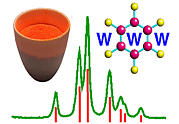 |
Advanced Certificate in Powder Diffraction
on the Web
Course Information 2001/2002 School of Crystallography, Birkbeck College, University of London |
 |
Advanced Certificate in Powder Diffraction
on the Web
Course Information 2001/2002 School of Crystallography, Birkbeck College, University of London |
Aims
Both industry and academia are producing materials with novel properties, e.g. zeolites for gas filtration and catalysis, ceramics, ferroelectrics, high-temperature superconductors, fullerenes, etc., the majority of which are not produced, at least initially, in single-crystal form. The advent of ultra high-resolution and high-intensity synchrotron diffractometers, high-resolution laboratory X-ray powder diffractometers, plus the combination of modern computer hardware and software has led to tremendous advances in the analysis of novel materials by powder crystallography.
From an industrial viewpoint, the trend has been away from simple phase identification and more towards quantitative analysis using similar software to that used by the solid-state crystallographer. Furthermore, the modern solid-state materials chemist/physicist has to be a multi-technique-oriented scientist with hands-on skills.
This Advanced Certificate course, now in its third year, proposes to offer training in one of the major techniques used for solid-state materials research, namely powder diffraction. It will concentrate on providing the necessary crystallographic and computational skills required for an understanding and usage of the technique.
Course Organisation and Objectives
The Advanced Certificate in Powder Diffraction on the WEB, is a tutor-assisted, university-level, accredited course, offered by the School of Crystallography, Birkbeck College, University of London. Successful students who complete the whole course and pass the final examination receive the award of an Advanced Certificate. Exceptionally, a student may opt not to take the unseen final examination, in which case a Certificate of Attendance may be given on the basis of course work only.
The course consists of 3 units taught annually. All teaching material will be delivered via the Internet.
Unit 1:
The general objectives of this unit are to provide the experimental and background information required for a student to use powder diffraction as an experimental technique. In addition, it aims to provide the relevant crystallographic theory for an understanding of the technique and for data interpretation.
Unit 2:
The general objectives of this unit are to teach the different methods of analysing powder diffraction data according to different research objectives. The unit aims to give students practical skills in computational analysis of the diffraction data and to demonstrate current developments in the technique.
Unit 3: Project
The general objective is for students to apply and demonstrate the skills and tools learnt in Units 1 & 2 via a computer-based project involving the analysis of powder diffraction data. The project will be written up and submitted as Web-based documents (in HTML) to show the students skills in Web publishing.
Specific objectives are:
Further details of the course content are given in the syllabus.
Birkbeck College requires as minimum eligibility requirements BSc (Bachelor of Science degree) or equivalent (for EU or non-EU overseas students) a subject allied to one of the following: Mathematics, Physics, Chemistry, Biology, Mathematics, or Computer Science. Click here for further details.
Students will be expected to have a standard windows-based PC and access to the Internet. Click here for further details.
Workload and Course Participation
Language
The language of the course is English combined with HyperText Markup Language (HTML) for the delivery and receipt of course material, assignments, and projects.
Course Textbooks
Since this is a web-based course, you are not required (or even expected) to have access to a library of textbooks. Registration for this course provides no entitlement to Birkbeck College library or to on-line journals available via subscription. It is a general course aim that the material is self-contained, though links will be given to external material publically available on the Internet when relevant.
The course leads to the award of an Advanced Certificate from Birkbeck College, University of London. Each student is assessed by a combination of the work assignments submitted in terms 1 and 2, the project submitted in term 3 and an unseen final written examination after term 3. On rare occasions, a short oral examination by telephone may also be required. Click here for further details.
The level of fee for 2001/2002 has been set by the college for Web-based Advanced Certificates as follows:
An additional one-third (1/3) fee will be payable for those students who have followed the course, but who postpone the written examination to the following year.
Course Organiser and Admissions Tutor
Course Tutors
Dr Martin
Attfield
Prof
Paul Barnes
Dr
Jeremy Karl Cockcroft
Course Administrator
Ms. Maureen Austin (email: admin@img.cryst.bbk.ac.uk)
| © Copyright 1997-2000. Birkbeck College, University of London. |